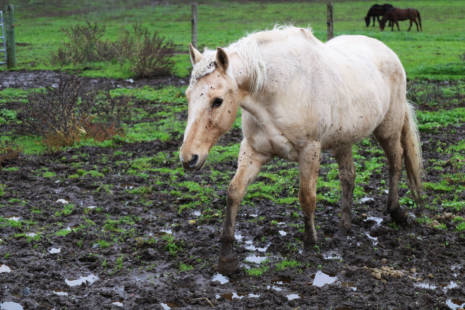Monday 12th March, 2018

The fields are finally thawing and the crocuses are peeping out as spring approaches. However, horse owners know only too well that wet weather follows freezing temperatures, and this can cause havoc in your fields. Excess rainwater means mud and lots of it. Mud can cause a myriad of health conditions from tendon sprain to mud fever, so read on to find out how to help prevent muddy misery this season.
Without adequate field drainage, paddocks are at risk of becoming waterlogged as the unrelenting downpours kick in. Even well-drained paddocks may find themselves the victim of boggy quagmires, especially around field shelters and gates. Good sod, which is the mixture of vegetation roots and soil will help absorb excess water and hold the pasture together. Try sowing grass seed in areas of high traffic, and also check nearby roofs or pens that may be draining water into your paddock. A simple gutter system to redirect rainwater can have a marked impact on your pasture.
It is essential that horses have adequate shelter from the elements, and a clean dry field shelter can mean all the difference to horses this season. Mobile field shelters are ideal as they allow you to rotate their location to protect the land while allowing your horse to escape the mud and rain and rest their hooves.
It goes without saying that horses with weakened tendons or injuries of any kind should not be turned out in thick muddy fields. If you don’t have a suitable alternative paddock to use, it would be best to exercise your horse on a lunge line in the ménage or on gentle hacks to prevent unnecessary sprain or damage to their limbs.
Daily washing and drying of muddy legs is essential, as the combination of warm, damp skin and mud provides the perfect environment for bacteria to breed. When bringing horses in, ensure that their feet and fetlocks are washed and dried to remove any mud. Also check for inflammation, grazes, cuts and heat or swelling in the lower limbs. Horses with long feathers can conceal the start of mud fever, so be sure to pay close attention to these areas. Avoid using shampoos on the lower limbs daily because they can strip the skin and coat of vital oils that offer natural protection from exposure to the elements.